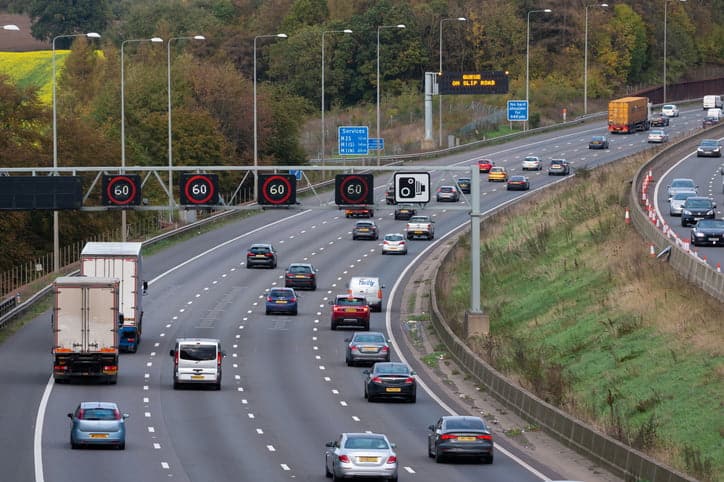Speed is the single biggest talking point on UK roads, with many drivers believing they’re too strict and others saying they’re too lax. But with news that Highways England is introducing a 60 mph cap on some sections of our motorway network, what might this mean for motorists?

Here, we take a look at the new 60 mph motorway speed limit, including where it’s being introduced, who it will affect, and whether or not it could actually benefit drivers in the long term.
Where is the 60 mph Motorway Limit Being Introduced?
Highways England is introducing the new 60 mph limit on four motorways in October 2020, initially on a trial basis. Each limit will apply on a five-mile stretch on the following motorways:
- M6 – between junctions 6 and 7
- M1 – between junctions 33 and 34
- M602 – between junctions 1 and 3
- M5 – between junctions 1 and 2
The temporary speed reductions will be in place for one year. After the trial, the impact will be assessed and a decision made on whether to roll out the new 60 mph limit to other sections of the UK motorway network, with a view to curb pollution.

Why is the Speed Limit Being Reduced on Motorways?
Highways England is reducing the speed limit to find out if it will help reduce air pollution on stretches of road with higher than recommended levels of nitrogen dioxide. It’s hoped the 10-mph difference could reduce the amount of harmful pollutants on roads which have experienced poor air quality in recent years, particularly those close to residential areas.
As the UK government continues to work towards its carbon-reduction targets, road and highway agencies are carrying out several trials aimed at reducing air pollution and emissions. The decision to reduce the national speed limit by 10 mph follows news of similar measures introduced in the Netherlands in 2019, when the Dutch government capped highway driving speeds at 100 kph (62 mph) in a bid to reduce vehicle emissions, particularly at peak times.
What Are the Benefits of Reducing the Speed Limit?
Reducing speed limits on motorways may sound like a bad idea to lots of drivers out there, but it could actually bring benefits in the long-term – and not just from a reduced air pollution perspective.
- Improved road safety – it’s hoped limiting speeds to 60 mph could reduce the number of fatal and severe accidents on motorways.
- Greater fuel economy – 10 mph may not sound like much, but driving at 60 mph compared to 70 mph works wonders for fuel economy. If you’re someone who commutes on the motorway, your drive to work could be cheaper if speeds are capped at 60 mph.
- Reduced engine wear – the faster you drive, the more strain is placed on the engine. A 60-mph limit could help vehicle longevity, and reduce the likelihood of engine-related breakdowns.
- Reduced tyre wear – tyres can also benefit from slower speeds, with a 10-mph reduction making a significant difference to tyre wear rate.
Of course, a reduction in speed limit may not be convenient, and many drivers will be unhappy with the decision. But given the potential benefits, it could be good news for British motorists in the long term.

How Could this Affect UK Speed Limits in the Future?
The 10-mph motorway speed reduction is only at a trial stage, and may never be rolled out nationwide. However, if the results look promising after 12 months, what might a permanent change mean for speed limits on other roads around the country?
Currently, the 70-mph motorway speed limit is the national speed limit; the fastest you can legally travel on unrestricted roads in the UK. If a 60-mph speed limit was introduced on motorways, this could have a knock-on effect across the network – with reduced limits to reflect the lowered motorway speed.
For example, rural A roads are generally restricted to 60 mph, so would a reduction in the motorway limit mean they dropped to 50 mph? It isn’t yet clear what a change to the national speed limit might mean for limits on other road types.
The introduction of reduced speed limits is likely to be a very divisive issue, so we’d love to hear your thoughts on the topic. To have your say, join the conversation over on the Redex Club Facebook group page.
For more of the latest motoring news and features, click here to explore the Redex blog. If you’d like to learn about our range of fuel additives and system cleaners, visit the homepage today.